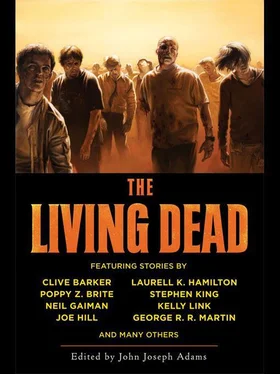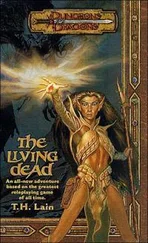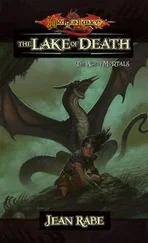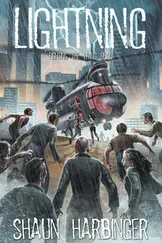(The screaming stops—cut off. Mary removes her hands from her ears hesitantly, as if afraid her children’s screams might start again.)
Mary: That’s—there are—they—there are some—I don’t—there are some things a mother shouldn’t have to see, all right? My parents—I—when I was growing up, our next door neighbors’ oldest son died of leukemia, and my mother said, “No parent should outlive their children.” Which is true. I used to think it was the worst thing that could happen to you as a parent, especially of small children. But I was wrong—I was—they—oh, they had them in their teeth—
(Now Mary screams; head thrown back, eyes closed, hands clutching her shirt, she opens her mouth and pours forth a wail of utter loss. When her scream subsides to a low moan, her head drops forward. She brings her hands to her head, runs one over it while the other winds one of the long strands of her hair around itself.
(From the front of the theater, Mary’s voice speaks, but from the echoey quality of the words, it’s clear this is a recording.)
Mary’s Voice: That second, the second my fingers are closing around the handle—that’s the one I return to. When I replay the three minutes it took my life to disintegrate, I focus on me in the kitchen. I can’t remember how I got there. I mean, I know how I went from the stairs to the kitchen, I don’t know why. Once I reached the top of the stairs, it would have been easy enough to haul myself to my feet and run into the living room, to Robbie and Brian. We could have—Robbie and Brian. I didn’t want to expose them to something like that. A parent—a mother isn’t supposed to—that’s not your job. Your job—your duty, your sacred duty, is to protect those children, to keep them safe no matter what—we—instead, I ran for the kitchen. I realize I must have been thinking about a weapon; I must have been searching for something to defend myself—us with, and the pot on the stove must have been the first thing that occurred to me. This has to be what made me choose the kitchen, but I can’t remember it. You have to protect them, no matter—
(The recording stops. The spotlight snaps off, and Mary is gone, lost to the darkness.
(Slowly, the Stage Manager comes to his feet. Once he is up, he looks away from the audience, towards the willow behind him. He takes a deep breath before turning towards the audience again.)
Stage Manager: Here’s the problem. When you sign up for this job—when you’re cast in the part, if you like—you’re told your duties will be simple and few. Keep an eye on things. Not that there’s much you can do—not that there’s anything you can do, really—but there isn’t much that needs doing, truth to tell. Most of the business of day-to-day existence takes care of itself, runs ahead on the same tracks its used for as long as there’ve been people. Good things occur—too few, I suppose most would say—and bad things, as well—which those same folks would count too numerous, I know—but even the very worst things happen now as I’m afraid they always have. Oh, sure, could be you can give a little nudge here or there, try to make sure this person won’t be at work on a June morning that’ll be full of gunfire, or steer the cop in the direction of that house she’s had a nagging suspicion about, but mostly, you’re there to watch it all take place.
Then something like this—then this, these zombies, folk getting up who should be lying down—it overtakes you, sweeps across the world and your part of it like—like I don’t know what, something I don’t have words for. You do the best you can—what you can, which mostly consists of putting on a brave face and not turning your eyes away from whatever horror’s in front of you; although there may be opportunities for more direct action.
(Through his jacket, the Stage Manager pats his gun.)
Stage Manager: You try to maintain some semblance of a sense of humor, which is not always as hard as maybe it should be. There’s something to the old saw about horror and humor being flip sides of the same coin. An idiot takes his arm off with his chainsaw trying to play hero—I grant you it’s pretty grim fodder for laughs, but you make do with what’s to hand—so to speak.
A situation like this, though, like this poor woman and her children—those children—I know what she saw when she ran into that living room. I know what that is on her shirt, and how it got there. I can’t—I don’t have the faintest idea what I’m supposed to do with that knowledge. I could tell you, I suppose, but to what end? You know what those things—those eaters, that’s not a bad word, is it?—you know what they did to that little girl and that little boy. There’s no need for the specifics. Maybe you’d rather hear about the scene that greeted Mary when she fled her house in horror, or maybe you’ve guessed that, too: her neighbors’ houses overrun, pretty much without a single shot being fired.
This is the beginning of the second phase of the zombie trouble—what did that newscaster call it? The Reanimation Crisis? From something people were watching on their TVs, or seeing outside the windows of their trains, zombies become something that’s waiting for you when you go to get in your car, that clatters around your garage, that thumps on your door. Situation like this, where folks have known the world’s going to hell and been preparing themselves for it—which mostly means emptying their bank accounts accumulating as many guns as Wal-Mart’ll sell them—you’d expect that all that planning would count for something, that those zombies never would have made it up Mary’s front walk, that one or the other of her neighbors would have noticed what was tumbling out the back of that delivery truck and started shooting. There’d be a lot of noise, a lot of mess, possibly a close call or two, but everything would turn out well in the end. Mary would be home with her kids, her neighbors would be patting themselves on the backs with a certain amount of justifiable pride, and at least one zombie outbreak would have been contained. Instead, Mary’s the only one to escape alive, which she accomplishes by running screaming out of her house, up the street and out onto Route 376, where she’s struck by a red pickup truck driven by an eighteen-year-old girl who received it as a birthday present from her parents last month.
Mary avoids being hit head-on, which would’ve killed her, but she’s tossed to the side of the road. To her credit, the girl stops, reverses, and leaves the truck to see to the woman who collided with it. Actually it’s a risky move—for all the girl knows, she could’ve knocked down a zombie. Mary’s pretty seriously concussed, but it’s clear to the girl she hails from one of the big houses on the side street—the houses from which a few zombies are emerging, doused with blood. The girl doesn’t waste any time: she hustles Mary into her truck and literally burns rubber racing away. The girl—who deserves a name: she’s Beth Driscoll—Beth takes Mary into the center of Goodhope Crossing, to the new walk-in emergency-care place, and stays with her as the doctor examines her with an openly worried expression on his face. Mary’s in what he’s going to call a fugue state—like being part of the way into a coma—and she’s never going to surface from it. The doctor—Dr. Bartram, for the record—tries to arrange for an ambulance to transfer her to one of the local hospitals, but all at once, the ambulances are very busy. By the time he considers driving her himself, the police will have told everyone to stay off the roads. When those same police start stumbling through the front doors with wounds of their own for the doc to treat, Mary will be placed on a cot in one of the hallways and left there. Beth will check on her as she’s able, which won’t be much, because she’ll be busy helping the doc and his staff with the injured. After the medical facilities are transferred to St. Pat’s church hall, Mary’s installed there, given a futon-bed and a molded plastic chair and a garbage bag full of assorted sweatpants, t-shirts, underwear, and socks. Beth tends to her as she can.
Читать дальше
Конец ознакомительного отрывка
Купить книгу












